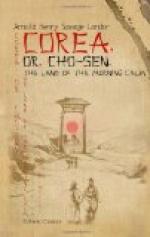The illustration (p. 79) shows a young married man of the age of twelve, a relation of the queen. As I was taking his portrait, I asked him how he liked his wife and what her appearance was.
“I do not know,” he said, “for I have only seen her once, and I have as yet never spoken to her.”
“But, then, how can you like her?”
“Because it is my father’s wish that I should, and I must obey my father.”
“Does your father know the girl well?”
“No, but he knows her father.”
“And what does your mother say?”
“She says nothing.”
“Why?”
“Because she is dead.”
I found this an excellent reason for the silence on the mother’s side and I proceeded with the picture, but once again attacked him with the view of, if possible, obtaining further information.
“When will you go and live with your wife?”
“When I shall be nineteen or twenty years old.”
The whole arrangement seemed to me so strange that I naturally longed for further details about marital relations in Cho-sen. The facts as told to me are as follows: In Cho-senese weddings the two people least concerned are the bride and bridegroom. Everything, or at least nearly everything, is done for them, either by their relations or through the agency of a middle-man. When both the persons to be wedded possess fathers, a friendly pourparler takes place between the two papas and in the course of repeated libations of wine, the terms are settled, and with the help of a “wise man” a lucky day is named, upon which the wedding shall take place. On the other hand, should the bridegroom have no father, then a middle-man is appointed by the nearest relations to carry on the transaction with the girl’s progenitor. It is not uncommon for two persons to be married several years without ever having seen each other. This, for instance, may be the case when the young lady resides in a distant province, and a journey of inspection would be too expensive. Under such circumstances the bridegroom must just patiently wait until, perhaps, years after, the bride undertakes the journey herself and comes to live with him in his house.
After all, on thinking the matter over and bearing in mind that with us a marriage is indeed a lottery, I cannot see why the Corean wedding should not be equivalent to two lotteries! Very often, weddings are arranged by letter, in which case misunderstandings frequently occur. For instance, a father who has two daughters, a sound one and a cripple, may have arranged for the one in good condition to be married to a charming young man of good education and means. When the day of the wedding, however, arrives, judge of the surprise of the bridegroom to see himself on the point of being united in matrimony with a humpback lame creature, with a face and limbs all out of drawing—in place of the ideal beauty whom he had expected to obtain. What is




